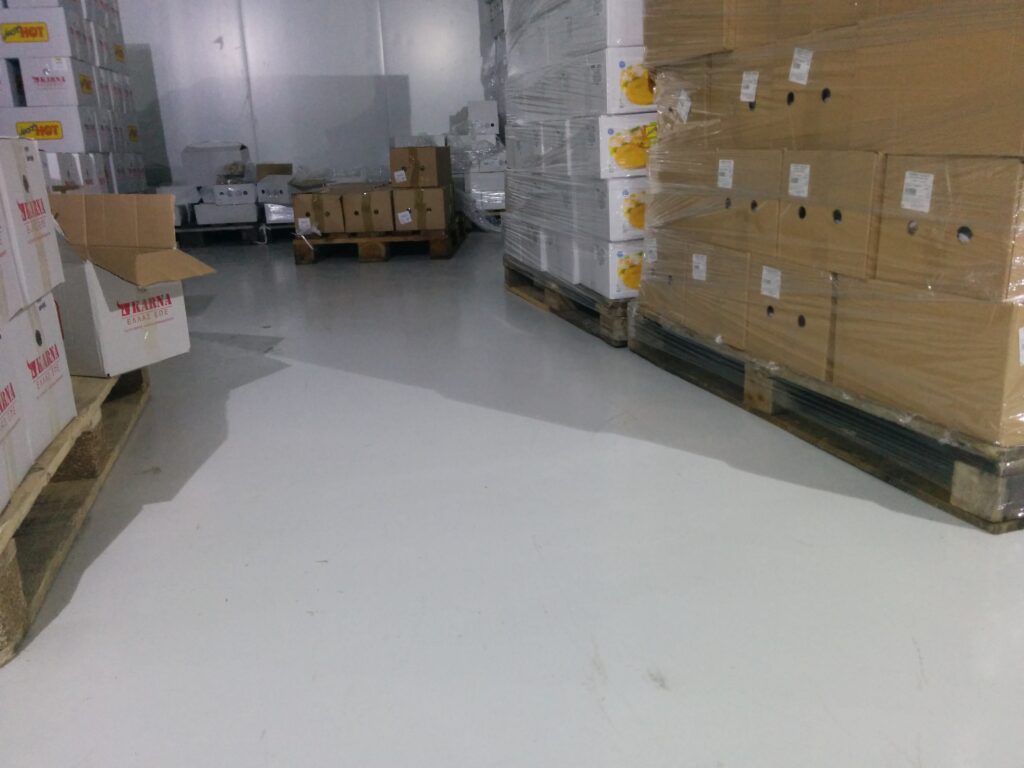
PU Flooring
PU systems are therefore very well suited to industrial facilities, where the floor is likely to face a long list of challenges on a daily basis. For example, just a hand pallet truck when fully loaded could weigh in excess of one tonne, which puts a vast amount of pressure through its wheels and into the floor.
Polyurethane Floors are an alternative to epoxy flooring. They can be either one-component (moisture curing) or two component when they cure as a result of mixing two components together.
The most common forms of polyurethane flooring are:
- Roller and squeegee applied Floor Coatings
- Clear coats used to protect surfaces from scratching
- Varnishes for wooden floors
- Thicker floors applied with a trowel at a thickness of 2-3 mm
- Cement based polyurethane floor often applied at thicknesses up to 1cm
Compared to Epoxy Floors, they tend to be softer and have a higher elasticity.
If you want a more detailed comparison of epoxy vs polyurethane, the video below should guide you.
Polyurethane Flooring: Where do we install such floors?
We often see the use of PU Floors in applications where epoxy may not be suitable. Perhaps the most widespread use, of polyurethanes is in multi-storey car parks. Due to the elastic nature of the coating, they can act as a waterproofing layer for each floor.
Polyurethane floors are also suitable for outdoor applications. Epoxy is not resistant to the sun’s UV rays, but aliphatic polyurethanes are. Aliphatic polyurethane floor coatings are flexible, which makes them a perfect solution when you want the coating to act as a waterproofing surface on top of the overall protection of the concrete.
Personally, I have applied aliphatic PUs in many outdoor car parks, beach bars, decks, and even loading ramps.

These coatings are also scratch resistant. Therefore in commercial applications, we often apply a clear polyurethane coat over an epoxy floor, as a protective non scratch layer.
The Elasticity of Polyurethane Floors has many advantages
Another common application of polyurethane floors are in freezing chambers. Epoxies don’t to work well once the temperature drops below zero celsius. Once the temperature drops below zero, they tend to break since they just dont have the elastic properties to withstand such low temperatures.
This is where we commonly apply a 2 mm thick polyurethane floor coating. It creates a nice elastic surface that allows the frequent movement of pallet trucks without any damage.

We also install thick elastic PU coatings in gyms, schools and commercial spaces. Their texture is soft and not as glossy. The elastic surface tends to absorb some of the impact from foot traffic, and therefore makes it a friendlier surface for people to walk on.
Especially in schools, sports facilities and even yoga studios, such floor coatings are considered convenient and safe.
Finally, some types of PU floors are commonly used in heavy duty industrial applications. Cement based PUs are often applied on surfaces that need to be cleaned with very hot water. For example in food manufacturing, if you try to washing a conventional coating with water at 70 degrees celsius, the surface will very likely undergo a heat shock that could cause the surface to peel.
A cementitious polyurethane cement (with Ucrete being the best known brand) can withstand such impact. Furthermore such cementitious surfaces are also resistant to many different types of acids.
Installation of Polyurethane Floor Coatings
Installing such coatings should only be done by professionals. Whereas epoxy is easier to use, polyurethane floor coatings are far more challenging to apply.
Polyurethane is very sensitive to moisture. The slightest bit of moisture can cause a chemical reaction. We are not just talking moisture in the substrate, but also moisture in the atmosphere.
Polyurethane, once cured is very difficult to re-coat without doing some prior surface preparation first. But even trying to sand a polyurethane surface is challenging. For example, sanding an epoxy surface is fairly easy. But a PU coating due to its anti-scratch nature does not scratch as easily.
I have talked in the past about my nightmares with clear coatings. Polyurethane clear coatings often have problems with surface tension. Another issue is that they are very sensitive to micro-dust, which can lead to the dust getting trapped.
Cementitious polyurethanes require anchoring prior to applying the floor. Furthermore, since most PUS tend to cure quite quickly you need a well organised and experienced staff to apply the floor quickly without any troubles
Finally I want to ask you, what are your experiences with polyurethane floors? Leave a comment below!

